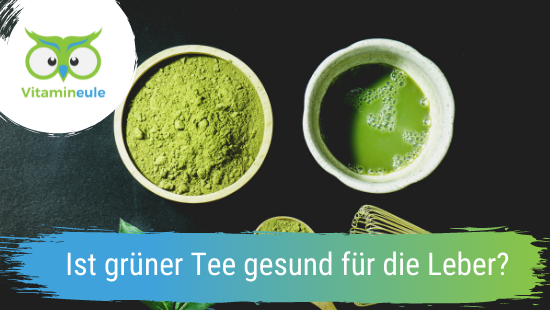

Team Vitamineule
Questions, wishes or suggestions? Just contact us by email or on Facebook.
1. is green tea healthy for liver?
Many people wonder if green tea is healthy for the liver. Green tea can neutralize free radicals, which are produced in the liver. Thus, the human organism is protected and attacks can be avoided. Taking green tea increases the success rate of liver transplantation and lowers high blood pressure.
2. properties of green tea
Green tea ...
- is rich in health-promoting substances (secondary plant compounds)
- supports the brain (fatigue is suppressed and one feels more awake)
- boosts performance (increase in energy metabolism)
- protects against cancer through antioxidants
- reduces the risk of cardiovascular diseases
- helps to lose weight
- protects against overweight
3. origin of green tea
In Asian cultures, green tea has been around for thousands of years. There it is considered not only as a stimulant, but is also used in medicine. Green tea used to be grown mainly in China. Nowadays, the tea plant has been successfully cultivated and is also grown in other countries. Thus, in addition to China, India, Japan and Taiwan are among the main processors of green tea. To grow the green tea, you need an ideal breeding ground. High humidity is one of the most important requirements. The leaves of the plant are picked and steamed. Oxidation is prevented by the heat, so the color is preserved.
4. iron-containing food supplements
Green tea is commercially available in the form of dietary supplements. It comes in the form of green tea capsules and green tea tablets. Both forms are easy to use and enter the circulation quickly. However, green tea tablets are sold in pharmacies, which in many cases contain artificial additives or are manufactured abroad. Green tea capsules often contain only the active ingredient in a vegetable cellulose shell and can therefore be produced without fillers. The most natural way to ingest green tea is, of course, to brew green tea fresh. However, supplements have the advantage of being much more concentrated than fresh tea. Furthermore, green tea capsules or green tea tablets are easier to take on the go. Green tea capsules or green tea tablets should be taken with sufficient liquid (for example water or juice). It does not matter whether green tea is taken before or after a meal. However, if you have a sensitive stomach and cannot take green tea tablets or green tea capsules on an empty stomach, you should eat something beforehand and take the supplements afterwards. In general, it should always be ensured that the product was produced in Germany in order to guarantee a consistently high preparation quality. If you buy a preparation from Germany, you can be sure that the product was also produced safely and has a high quality.
Our recommendation:
Vitamineule® Green Tea Capsules
In our online store you can find our Green Tea Capsules from Vitamineule®, which are completely free of artificial additives. Vitamineule® Green Tea Capsules contain 100 mg of pure caffeine per capsule. Each tin contains 90 capsules. In addition to fast & free shipping, we offer a voluntary six-month return guarantee on all products.
5. conclusion: Is green tea healthy for the liver?
In this blog, you will learn more about whether green tea is healthy for the liver and the human organism. Green tea can be supplemented in the form of dietary supplements or drunk as tea. Green tea is very healthy, promotes the human organism and has a cleansing effect. In the form of supplements, you can choose between green tea capsules and green tea tablets. Both forms are easy to use and enter the circulation quickly. Changes in intake should always be discussed with a physician.
Further reading:
- Management of Iron-Deficiency Anemia in Inflammatory Bowel Disease.
- Management of Iron Deficiency Anemia.
- Quantification of mitral valve anatomy by three-dimensional transesophageal echocardiography in mitral valve prolapse predicts surgical anatomy and the complexity of mitral valve repair
- [Letter to the editor about "Green tea with lemon: Suggestions for a good food combination" kks; 02/15, p. 65-67]
- A Review of the Role of Green Tea ( Camellia sinensis) in Antiphotoaging, Stress Resistance, Neuroprotection, and Autophagy.

